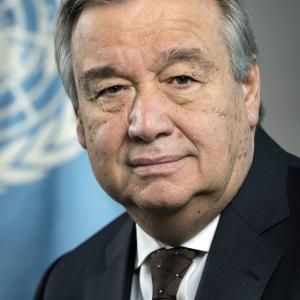It is indeed a pleasure to be here with all of you to mark the 70th anniversary of the Universal Declaration of Human Rights.
The rights enshrined in this foundational document belong to everyone, everywhere; they have no physical or [moral] frontier.
Human rights are not the sole purview of north, south, east or west; or of developed or developing countries. They are independent of nationality, circumstances, gender or sexual orientation, race, religion or belief.
The first article of the Universal Declaration is clear: “All human beings are born free and equal in dignity and rights.”
Human rights are of value in themselves; they are not at the service of any other agenda. And no one ever loses their human rights, no matter what they do.
Excellencies, ladies and gentlemen,
Over the past 70 years, the concept of human rights set out in the Universal Declaration has had a revolutionary impact. It has permeated policies and constitutions, from the global level to national and regional frameworks.
In this way, the Universal Declaration has unleashed the power of women’s full participation; it has spurred the fight against racism, xenophobia and intolerance – including the anti-apartheid movement in South Africa, as Nelson Mandela told the General Assembly twenty years ago.
The Universal Declaration has heralded movements by groups of all kinds, from indigenous people to people with disabilities, to claim their rights.
There is now broad recognition that, as Kofi Annan said, “The human family will not enjoy development without security, will not enjoy security without development, and will not enjoy either without respect for human rights.”
Sadly, we still have a long way to go before respect for human rights is truly universal.
Many people around the world still suffer from abuse of their rights. Gender inequality is one of the greatest human rights challenges we face. Refugees and migrants, people who do not conform to gender norms, and minorities of all kinds are frequently targeted for denial and abuse of their rights.
There is still resistance to supporting human rights, often linked to a false dichotomy between those rights and national sovereignty. But human rights and sovereignty must go hand in hand.
Human rights strengthen States and societies and reinforce sovereignty. We have ample evidence that state-sponsored human rights abuses are a sign of weakness, not strength. They are often precursors to conflict and even to collapse.
I urge all Member States to heed these lessons and to strengthen support for United Nations action on human rights, including the Human Rights Council and the Office of the High Commissioner. It is a pleasure to see Michelle, my dear friend Michelle Bachelet, here today.
And I call on Governments that have not signed or ratified the two human rights Covenants, the International Covenant on Civil and Political Rights and the International Covenant on Economic, Social and Cultural Rights, to do so urgently.
Excellencies, ladies and gentlemen,
Every social movement for human rights and solidarity in history has been led by young people.
It was the fight for human rights and democracy in my country, under Salazar’s dictatorship, that triggered my own interest in political action.
There is a special place in my heart for young women and men who are speaking out for social justice.
On Monday, I launched my new youth strategy, Youth 2030, to bring young people into the centre of our work.
I urge young people to make this space your home, to bring your energy and passion here, to challenge our ways of doing things and to take up the torch for our common humanity.
You are the true custodians of the Universal Declaration of Human Rights and the guarantee that it will not succumb.
I entrust you with keeping it alight for another seventy years, to show us the path to a world of peace, dignity and opportunity for all.
Thank you.



